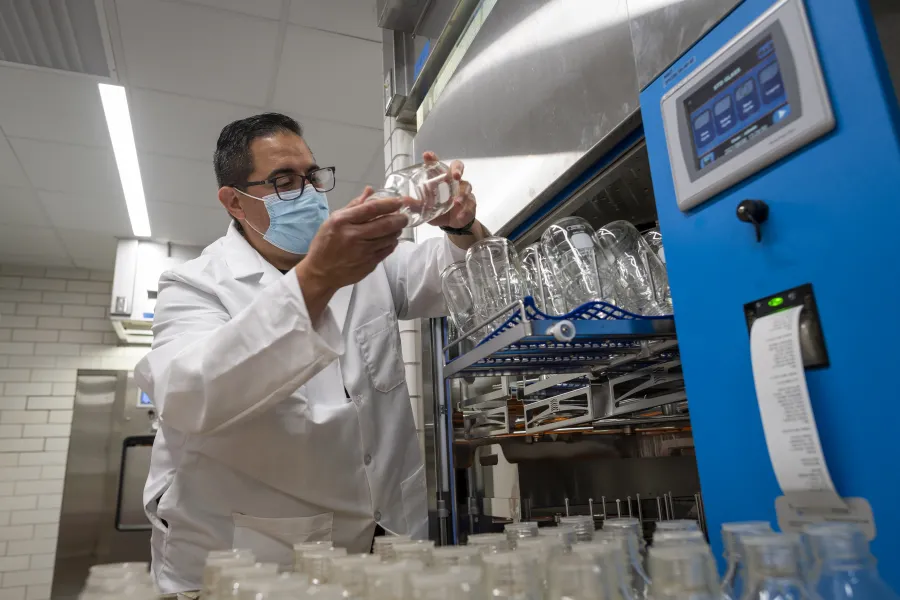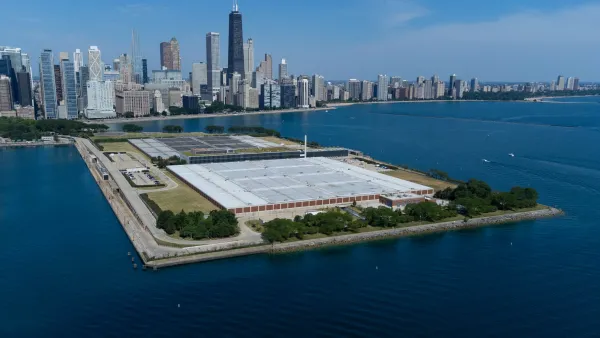AFSCME members keep Chicagoland's water running

If you live in the Chicago area, the twist of your faucet yields some of the cleanest, purest drinking water in the world—and you have AFSCME members to thank for it.
The process that purifies and distributes that water is often taken for granted, but behind the scenes at Jardine Water Purification Plant, members of AFSCME Local 2946 are working day and night to keep the water flowing for millions of Chicago-area residents.
They’re chemists who monitor water quality levels. They’re engineers who staff the all-important control center and ensure critical filtration and treatment equipment is functioning properly.
“There’s a lot of work in between when we bring the water in and when it goes out to the public,” said Karma Ashley, a water chemist at Jardine and a Local 2946 steward. “There’s a lot of hands involved in making sure that your water is safe to drink and take a bath in.”
Located on a sprawling campus just north of Navy Pier, Jardine is the world’s largest water filtration plant. From there, AFSCME members supply millions of people with clean drinking water, 24 hours a day.

Its capabilities are staggering. At full capacity, Jardine can filter and distribute 1 billion gallons of water a day—enough to fill the Sears Tower two and a half times. It can treat enough water to fill two Olympic swimming pools per minute. On average, it produces around 500 million gallons a day.
For employees, working at Jardine comes with enormous responsibility. Guided by Environmental Protection Agency standards, safe drinking water for millions of Chicagoland residents is in their hands.
“When we leave at the end of the day, I know that when my family drinks the water, they’re not going to get sick,” said Miguel Guzman, a filtration engineer IV. “It’s a good feeling to know that we’re doing everything we can, every day, to keep people safe.”
The process begins in the control center, where AFSCME members draw water into the plant from Lake Michigan, carefully monitoring demand throughout the Chicago area to make sure enough water is being pumped in and treated.
The water is pumped into massive filtration basins, where engineers treat it with chlorine to kill bacteria and fluoride to prevent childhood cavities. The engineers are responsible for ensuring the proper amounts of chemicals are applied and that the levels of those chemicals remain within federal standards.
Next, the water is filtered through layers of carbon to remove larger impurities. Now ready to drink, the water is piped to the city’s pumping stations to be delivered to homes and businesses.
The whole time, filtration engineers monitor water levels, chemical treatments, and critical equipment to make sure everything is functioning smoothly.
“The process of water going through a filter is not complicated, but the analytics are no joke,” Guzman said. “We’re constantly monitoring the water from beginning to end, all the time.”
The AFSCME members who work in the plant’s two chemistry labs run tests on water at various stages of the treatment process, and on the final product, to ensure it’s safe for public consumption. Each year, chemists perform 600,000 separate water tests to ensure water quality remains consistently high.
“We take this responsibility very seriously,” Ashley said. “People may not think about it this way, but what we do in the chemistry lab is really a form of public safety. We make sure that the public’s water is up to standards.”
Jardine isn’t Chicago’s only water purification plant. AFSCME members also work at the Sawyer plant that serves the city’s south side and south suburbs. Before Jardine was built in 1968, Sawyer held the title of the world’s largest.
In total, nearly 150 members of AFSCME Local 2946 work for the Chicago Department of Water Management in administrative support, accounting, payment services, engineering and chemistry roles. AFSCME members in the water department also work in the field, taking water samples and assessing infrastructure.
“Operating this plant takes teamwork,” Guzman said. “It’s a round-the-clock operation and we have to rely on each other to get through the day.”
